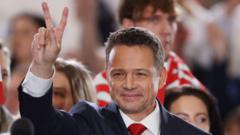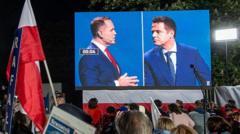An exit poll reveals that Warsaw's mayor, Rafal Trzaskowski, is currently in the lead for the presidency, though a run-off vote with conservative historian Karol Nawrocki is set to follow, as neither candidate achieved the necessary majority.
Trzaskowski Takes Lead in Polish Presidential Vote, Run-off Awaits

Trzaskowski Takes Lead in Polish Presidential Vote, Run-off Awaits
Warsaw's liberal mayor Rafal Trzaskowski edges ahead of his conservative rival in a tightly contested presidential election.
Warsaw Mayor Rafal Trzaskowski has secured a narrow lead in the Polish presidential election, according to an exit poll released as voting concluded. However, with a final tally not due until later, the contest is expected to culminate in a run-off against his conservative opponent, historian Karol Nawrocki. The exit poll indicates Trzaskowski garnered 30.8% of the votes, while Nawrocki followed closely with 29.1%.
The anticipated outcome will lead to a second round of voting on June 1, given that none of the 13 candidates exceeded the 50% requirement to win outright. In a rally in Sandomierz after the exit poll results, Trzaskowski expressed optimism, stating, "We're going to win," yet acknowledged the hard work that lies ahead. He vowed to push for liberal reforms, notably easing restrictive abortion laws and addressing concerns over the politicisation of the judiciary under the previous ruling party.
While expectations had initially placed him ahead of Nawrocki by a margin of 4%-6%, the final results may reshape campaign strategies significantly. The role of the president in Poland, although predominantly ceremonial, remains pivotal as they possess veto power over legislative decisions. Current Prime Minister Donald Tusk's coalition faces challenges in passing legislation due to recent presidential vetoes from the outgoing conservative president, Andrzej Duda.
If Trzaskowski wins, he could eliminate the presidential veto threat, which has hampered his coalition's agenda. Nawrocki has rallied his base against Tusk's pursuit of control, encouraging supporters from far-right candidates to join his cause against perceived liberal overreach.
The race ahead is set to hinge on voter mobilization for both candidates. Despite being less known prior to his nomination by the Law and Justice (PiS) party, Nawrocki's growing recognition could be advantageous, considering he hails from a party noted for its strong voter turnout efforts. Trzaskowski, meanwhile, will need to attract not only his own base but also appeal to voters from minor coalition partners who align ideologically.
Adding complexity to the scenario, unexpected results for far-right candidates, notably Slawomir Mentzen and Grzegorz Braun, could sway the electorate. As younger voters lean towards the anti-establishment Mentzen, the dynamic remains fluid. Braun's controversial past, including a disdainful incident involving Jewish symbolism, could alienate liberal voters and further impact the second-round voting patterns.
With the Polish electoral landscape shifting rapidly, the coming weeks will be critical for both frontrunners as they navigate alliances and address the varied concerns of an evolving electorate.
The anticipated outcome will lead to a second round of voting on June 1, given that none of the 13 candidates exceeded the 50% requirement to win outright. In a rally in Sandomierz after the exit poll results, Trzaskowski expressed optimism, stating, "We're going to win," yet acknowledged the hard work that lies ahead. He vowed to push for liberal reforms, notably easing restrictive abortion laws and addressing concerns over the politicisation of the judiciary under the previous ruling party.
While expectations had initially placed him ahead of Nawrocki by a margin of 4%-6%, the final results may reshape campaign strategies significantly. The role of the president in Poland, although predominantly ceremonial, remains pivotal as they possess veto power over legislative decisions. Current Prime Minister Donald Tusk's coalition faces challenges in passing legislation due to recent presidential vetoes from the outgoing conservative president, Andrzej Duda.
If Trzaskowski wins, he could eliminate the presidential veto threat, which has hampered his coalition's agenda. Nawrocki has rallied his base against Tusk's pursuit of control, encouraging supporters from far-right candidates to join his cause against perceived liberal overreach.
The race ahead is set to hinge on voter mobilization for both candidates. Despite being less known prior to his nomination by the Law and Justice (PiS) party, Nawrocki's growing recognition could be advantageous, considering he hails from a party noted for its strong voter turnout efforts. Trzaskowski, meanwhile, will need to attract not only his own base but also appeal to voters from minor coalition partners who align ideologically.
Adding complexity to the scenario, unexpected results for far-right candidates, notably Slawomir Mentzen and Grzegorz Braun, could sway the electorate. As younger voters lean towards the anti-establishment Mentzen, the dynamic remains fluid. Braun's controversial past, including a disdainful incident involving Jewish symbolism, could alienate liberal voters and further impact the second-round voting patterns.
With the Polish electoral landscape shifting rapidly, the coming weeks will be critical for both frontrunners as they navigate alliances and address the varied concerns of an evolving electorate.
















